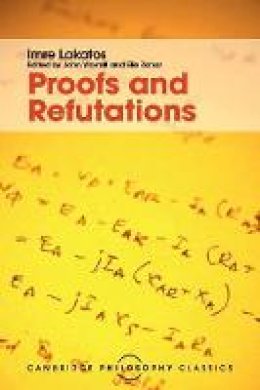
Stock image for illustration purposes only - book cover, edition or condition may vary.
Cambridge Philosophy Classics: Proofs and Refutations: The Logic of Mathematical Discovery
Imre Lakatos
€ 26.72
FREE Delivery in Ireland
Description for Cambridge Philosophy Classics: Proofs and Refutations: The Logic of Mathematical Discovery
Paperback. This influential book discusses the nature of mathematical discovery, development, methodology and practice, forming Imre Lakatos's theory of 'proofs and refutations'. Editor(s): Worrall, John; Zahar, Elie. Series: Cambridge Philosophy Classics. Num Pages: 196 pages, 27 b/w illus. 2 tables. BIC Classification: HPL; PBCD; PDA. Category: (UP) Postgraduate, Research & Scholarly. Dimension: 228 x 152 x 19. Weight in Grams: 308.
Imre Lakatos's Proofs and Refutations is an enduring classic, which has never lost its relevance. Taking the form of a dialogue between a teacher and some students, the book considers various solutions to mathematical problems and, in the process, raises important questions about the nature of mathematical discovery and methodology. Lakatos shows that mathematics grows through a process of improvement by attempts at proofs and critiques of these attempts, and his work continues to inspire mathematicians and philosophers aspiring to develop a philosophy of mathematics that accounts for both the static and the dynamic complexity of mathematical practice. With a specially commissioned Preface written by Paolo Mancosu, this book has been revived for a new generation of readers.
Product Details
Publisher
Cambridge University Press
Format
Paperback
Publication date
2015
Series
Cambridge Philosophy Classics
Condition
New
Weight
307g
Number of Pages
196
Place of Publication
Cambridge, United Kingdom
ISBN
9781107534056
SKU
V9781107534056
Shipping Time
Usually ships in 4 to 8 working days
Ref
99-2
About Imre Lakatos
Imre Lakatos (1922-74) was one of the twentieth century's most prominent philosophers of science and mathematics, best known for his theory of the methodology of proof and refutation in mathematics.
Reviews for Cambridge Philosophy Classics: Proofs and Refutations: The Logic of Mathematical Discovery
'For anyone interested in mathematics who has not encountered the work of the late Imre Lakatos before, this book is a treasure; and those who know well the famous dialogue, first published in 1963-4 in the British Journal for the Philosophy of Science, that forms the greater part of this book, will be eager to read the supplementary material ... the book, as it stands, is rich and stimulating, and, unlike most writings on the philosophy of mathematics, succeeds in making excellent use of detailed observations about mathematics as it is actually practised.' Michael Dummett, Nature 'The whole book, as well as being a delightful read, is of immense value to anyone concerned with mathematical education at any level.' C. W. Kilmister, The Times Higher Education Supplement 'In this book the late Imre Lakatos explores 'the logic of discovery' and 'the logic of justification' as applied to mathematics ... The arguments presented are deep ... but the author's lucid literary style greatly facilitates their comprehension ... The book is destined to become a classic. It should be read by all those who would understand more about the nature of mathematics, of how it is created and how it might best be taught.' Education 'How is mathematics really done, and - once done - how should it be presented? Imre Lakatos had some very strong opinions about this. The current book, based on his PhD work under George Polya, is a classic book on the subject. It is often characterized as a work in the philosophy of mathematics, and it is that - and more. The argument, presented in several forms, is that mathematical philosophy should address the way that mathematics is done, not just the way it is often packaged for delivery.' William J. Satzer, MAA Reviews For anyone interested in mathematics who has not encountered the work of the late Imre Lakatos before, this book is a treasure; and those who know well the famous dialogue, first published in 1963-4 in the British Journal for the Philosophy of Science, that forms the greater part of this book, will be eager to read the supplementary material ... the book, as it stands, is rich and stimulating, and, unlike most writings on the philosophy of mathematics, succeeds in making excellent use of detailed observations about mathematics as it is actually practised. Michael Dummett, Nature The whole book, as well as being a delightful read, is of immense value to anyone concerned with mathematical education at any level. C. W. Kilmister, The Times Higher Education Supplement In this book the late Imre Lakatos explores 'the logic of discovery' and 'the logic of justification' as applied to mathematics ... The arguments presented are deep ... but the author's lucid literary style greatly facilitates their comprehension ... The book is destined to become a classic. It should be read by all those who would understand more about the nature of mathematics, of how it is created and how it might best be taught. Education How is mathematics really done, and - once done - how should it be presented? Imre Lakatos had some very strong opinions about this. The current book, based on his PhD work under George Polya, is a classic book on the subject. It is often characterized as a work in the philosophy of mathematics, and it is that - and more. The argument, presented in several forms, is that mathematical philosophy should address the way that mathematics is done, not just the way it is often packaged for delivery. William J. Satzer, MAA Reviews
